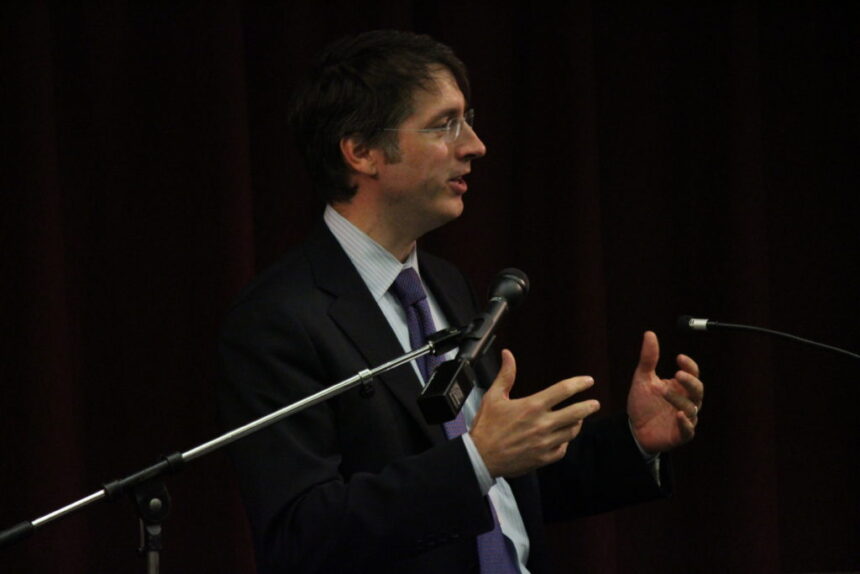Rich Lowry is the editor of National Review and author of the New York Times Bestseller “Legacy: Paying the Price for the Clinton Years.” He recently published a new book, “Lincoln Unbound: How an Ambitious Young Railsplitter Saved the American Dream—and How We Can Do It Again.” Lowry visited Hillsdale College as a guest of the Dow Journalism Program.
What started your interest in writing “Lincoln Unbound?” And where does one begin in the research process?
I have always been drawn to him as many people are. The idea for “Lincoln Unbound” came from “Abraham Lincoln: Redeemer President,” a book written by a historian named Allen Guelzo. In the beginning of the book there is a treatment of differences between Lincoln’s view of economics and Jefferson and the Jeffersonian Democrats. I had never seen that discussed. That was what really fired my interest in this particular angle on Lincoln. This college has statues of both Lincoln and Jefferson almost in sight of each other. But Jefferson was very much a romantic about the farmer in American life, and Lincoln having lived that life himself, had zero romanticism about it whatsoever. Lincoln was much more fired by the Hamiltonian vision of America where you have this financially diverse and sophisticated industrializing economy. He saw the Jeffersonian Democrats as associated with the corruption of the country.
What lesson could our current political leaders take from Lincoln in times of national division?
There are a couple of things. First, I think it is important to understand that he was partisan, he was very politically deep in his bones. He was a party leader. He saw nothing wrong with the party politics, it was what he spent most of his life doing. I think he would have a pretty high tolerance for the kind of things you see in Washington. A lot of it represents the clashing of two opposing point of views and Lincoln was very familiar with that. Even back when he was a Whig they had an inflammatory debate over the Bank of Illinois, which was chartered by the state. The Whigs supported the bank because of their economic vision. The Democrats were trying to kill it. There was this one incident, through a parliamentary motion, in which the Bank’s charter would end when the session of the legislature ended. The Democrats were using this to potentially kill the bank. Lincoln’s Whigs realized that if a quorum could not be called, the session couldn’t end. So Lincoln was monitoring how many people were on the floor of the legislature and he saw that the Democrats had managed to get enough Whigs in to get a quorum. So he and his partner jumped out a window and ran away because the doors were blocked by the sergeant of arms. He was ridiculed for this. But he was someone that would jump out of a window as a part of a parliamentary maneuver. Now granted this was when he was younger and more immature, but he had a high tolerance for partisan maneuvers.
What is missing from today’s political debates?
One of the things that was so great about Lincoln’s war leadership was his lack of certitude, ultimately, about his own correctness. The beauty and power of his second inaugural address is that the country was fighting this horribly bloody war, but there was Lincoln who said that the country bore responsibility and that God’s purposes were the country’s own. That represents a kind of found modesty, ultimately. We would probably have a better political debate and even a better discourse generally if everyone had a little of that doubt about themselves and their views somewhere underneath the discussion. Which doesn’t mean you can’t fight for your beliefs and try to uphold principle, but having that kind of modesty is important.
You have previously mentioned that National Review represents a certain civility, discourse, and wit. Could you speak to the role of National Review in this evolving media industry?
National Review has always planted the flag for the right. We try to put forth the best arguments for conservatism and our view of America and the importance of liberty. As we begin to use online and digital mediums, the purpose does not change but the content has a little bit. Things online tend to be shorter, they are more immediate than articles in a print magazine. But we seek to do the same thing, defending the same ideals in hopefully the same way. We take the arguments of the other side seriously, and engage them with excellent writing. The look and feel of National Review Online, is different than the print magazine. But the underlying of what it is, is the same. Twitter is more and more important, it is immediate and shorter. Even more immediate and shorter than the online content. Who knows what the next thing will be after Twitter? We aim to keep up with all of these trends. They are very important to the industry and getting the message out. We have always had the idea that we really aren’t a magazine, we are a cause. We create a community around that cause while advancing that cause. So if tomorrow, God forbid, the print magazine went away, that mission of National Review would stay the same but in different forms.

